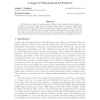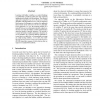129
Voted
UAI
2003
15 years 2 months ago
2003
Loopy and generalized belief propagation are popular algorithms for approximate inference in Markov random fields and Bayesian networks. Fixed points of these algorithms correspo...
104
Voted
UAI
2003
15 years 2 months ago
2003
We introduce a logic for reasoning about evidence that essentially views evidence as a function from prior beliefs (before making an observation) to posterior beliefs (after makin...
107
Voted
UAI
2003
15 years 2 months ago
2003
Real-world distributed systems and networks are often unreliable and subject to random failures of its components. Such a stochastic behavior affects adversely the complexity of o...
104
click to vote
UAI
2003
15 years 2 months ago
2003
This paper examines a number of solution methods for decision processes with non-Markovian rewards (NMRDPs). They all exploit a temporal logic specification of the reward functio...
UAI
2003
15 years 2 months ago
2003
UAI
2003
15 years 2 months ago
2003
UAI
2003
15 years 2 months ago
2003
100
Voted
UAI
2003
15 years 2 months ago
2003
Despite its simplicity, the naive Bayes classifier has surprised machine learning researchers by exhibiting good performance on a variety of learning problems. Encouraged by thes...
95
Voted
UAI
2003
15 years 2 months ago
2003
Symbolic representations have been used successfully in off-line planning algorithms for Markov decision processes. We show that they can also improve the performance of online p...
109
Voted
UAI
2003
15 years 2 months ago
2003
Learning with hidden variables is a central challenge in probabilistic graphical models that has important implications for many real-life problems. The classical approach is usin...


